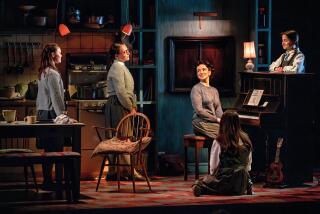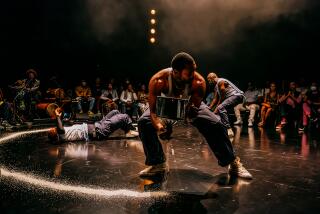Fully into the role for a total ‘Victory’
Morlan Higgins sits in the first row of the Fountain Theatre, back erect, eyes meditatively focused on the stage.
His character isn’t present for the first 11 pages of “Victory,” a new play by South African writer Athol Fugard. So as rehearsal begins, Higgins lingers in the auditorium, listening to the a cappella African vocals that serve as pre-show music.
“I’m going to be hearing that music” at every performance, he explains later, and it will become an entry point into the world he’s helping to create. “I was just letting it affect me. You have to immerse yourself; you have to let everything in.”
This total-immersion approach to acting makes Higgins one of Los Angeles’ most consistently compelling performers -- as poet Dylan Thomas in “Dylan” at the Skylight Theatre in 1994; as the authorial alter ego in Arthur Miller’s wrenching meditation on his marriage to Marilyn Monroe, “After the Fall,” at the Fountain in 2002; and as the imperious if emotionally bruised aging actor in Fugard’s “Exits and Entrances” at the Fountain in 2004.
When acting opposite Higgins, “you can never cheat yourself,” says “Victory” cast member Lovensky Jean-Baptiste. “If you’re not in the moment with him, then you’re just going to get left behind.”
“It’s about all of us doing the very best that we can,” adds actress Tinashe Kajese, “all of us really seeking the authenticity of these characters.”
“Victory,” like much of Fugard’s writing, is a rigorous yet compassionate study of race relations in his native South Africa. Unfolding in a tense, intermission-less hour, it relates what happens when Higgins’ character, a former teacher named Lionel, enters his home to face two young thieves.
The aging gentleman -- who tries to engage the poverty-hardened youths in a dialogue so he can better understand their circumstances -- should be pretty easy to recognize, Higgins says. “Lionel is clearly, in large portion, Athol Fugard.”
“When Athol sent me the script for ‘Victory’ and I read it,” says director Stephen Sachs, “the first and only actor I thought of in that role was Morlan. I called Athol and told him so, and he never questioned it being anyone else.”
The show opens Friday.
As Higgins chats over coffee one morning before rehearsal, he tends to get all hushed and reverent whenever he’s talking about the art of acting. Then, suddenly aware of how he must sound, he’ll dismiss himself with a cheerful obscenity.
His “Victory” costars are in their middle 20s, roughly half his 54 years.
When he was their age, he hadn’t discovered acting. Back then, he lived in Riverside and played mandolin, ukulele and, occasionally, guitar with a “really crazy, fun, club band” called Toe Jam. A connection made at a local venue led to an invitation to portray Biff, the disillusioned older son, in a 1983 production of “Death of a Salesman.”
“It just hooked me, big time,” Higgins says. He wasn’t quite 30.
He moved to L.A. later that year. “I had a lot of catching up to do. I used to walk from my little apartment, at Hollywood and Serrano, to a place that sold used plays. And I would spend 60 to 80 bucks a week on plays. I just devoured them. So I started writing and acting.”
Today, he can claim two Ovation Awards -- for “After the Fall” and “Exits and Entrances” -- to his credit.
He performed, at first, under his given name, Dave Higgins, but he worried that he was being confused with other Dave Higginses. So he began using his maternal grandfather’s name.
He’s worked a bit in television but wryly brushes off the brevity of his credits in that field as a “respectful but mutual disinterest.”
A divorced father of one, he supports himself as a registered nurse, working through a registry so that he has the freedom to set his hours or take time off.
“It costs me money to do a play, so I have to be sure that my soul’s going to get something out of it,” he says.
“Casting Morlan, for me, is more than just hiring an actor; it’s engaging a collaborator,” says Sachs, who previously directed Higgins in “The Boys in the Band,” “After the Fall” and “Exits and Entrances” at the Fountain and “Hippolytos” at the Getty Villa. “He understands how to tell a story.”
“Victory” was given its premiere in South Africa last spring, was subsequently presented by Peter Hall’s company in Bath, England, and has been entrusted to the 78-seat Fountain for its U.S. premiere.
The play is set in South Africa’s Karoo, Fugard’s home district. Lionel, in his 70s, is white and relatively well-to-do; Vicky and Freddie, the young thieves, are “colored,” the term used to describe South Africa’s mixed-race population, and live in poverty.
“The three of them, as a unit” represent the new, post-apartheid South Africa, Higgins says. “The new South Africa is still all of those same people who were there, with a lot of the same attitudes . . . certainly, very little has changed, in terms of who has the money and who doesn’t.”
Lionel, who is essentially the same age as the 75-year-old Fugard, hopes that he’s nurtured open-mindedness and empathy. On this bleak night, however, he realizes how imperfectly he has understood the realities faced by Vickys and Freddies of South Africa. “He’s just another burglary victim in this country that he’s given his life to,” says Higgins. “And I don’t think he’s angry. He’s just observing it.”
Fugard was on hand for the first read-through of the play. Higgins, a stickler for specificity, had a question about his role. “I asked him, ‘What about the accent? Would your accent be the right accent to use?’ And just the way he looked at me and said, ‘Oh, yes,’ I knew that his heart was deeply in this character.”
A detail, small yet elemental. Layer it atop additional details and, eventually, you end up with a story.
“ ‘Aesthetic arrest’ -- have you ever heard of that?” Higgins asks. It was a term used by James Joyce. “It’s that moment, for instance, when you’re looking at a painting and everything stops, everything is arrested -- you’re there and only there. I love that in the theater, when everyone is so in tune with what’s going on that we’re all the same breath, the same heartbeat.”
--
‘Victory’
Where: Fountain Theatre, 5060 Fountain Ave., L.A.
When: 8 p.m. Thursdays through Saturdays, 2 p.m. Sundays
Ends: March 9
Price: $25
Contact: (323) 663-1525
More to Read
The biggest entertainment stories
Get our big stories about Hollywood, film, television, music, arts, culture and more right in your inbox as soon as they publish.
You may occasionally receive promotional content from the Los Angeles Times.











